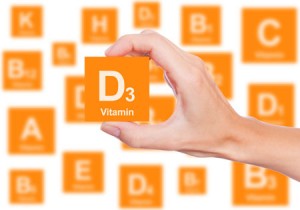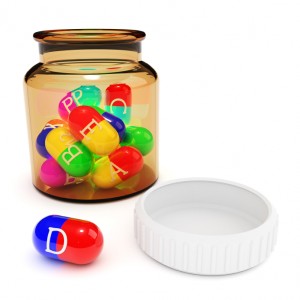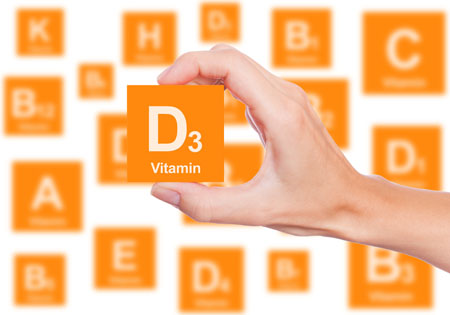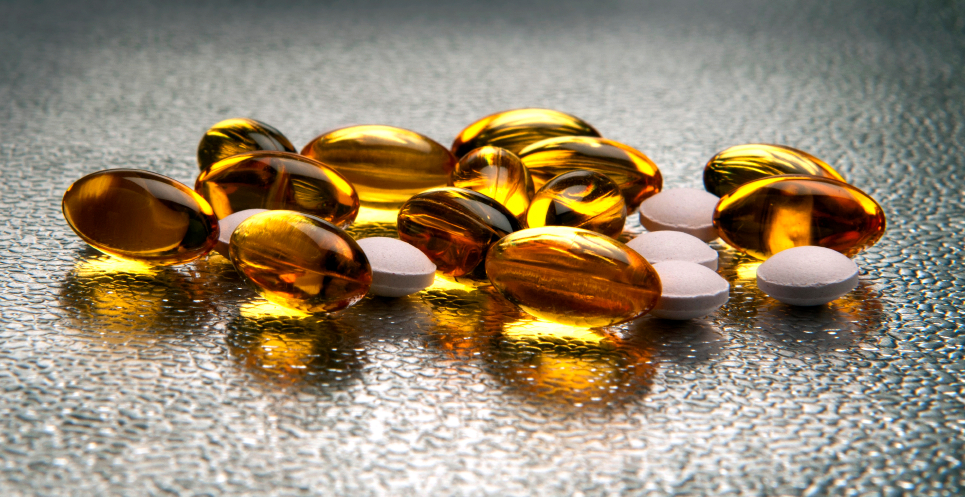Giving Infants Vitamin D Can Reduce Type 1 Diabetes
 A 2001 cohort study in Finland showed that giving vitamin D supplements to infants may reduce their risk for type 1 diabetes. The data for the study, by Elina Hyppönen and colleagues in the journal The Lancet, came from 10,366 people born in 1966. Their mothers were part of a medical registry that collected information on vitamin D given to children during the first year of their lives.
A 2001 cohort study in Finland showed that giving vitamin D supplements to infants may reduce their risk for type 1 diabetes. The data for the study, by Elina Hyppönen and colleagues in the journal The Lancet, came from 10,366 people born in 1966. Their mothers were part of a medical registry that collected information on vitamin D given to children during the first year of their lives.
Of the 10,366 people in Hyppönen’s study, 81 had been diagnosed with type 1 diabetes by the end of 1997. Those participants who were given vitamin D supplements during their first year of life were less likely to be diagnosed with type 1 diabetes than other participants. Those who regularly took the recommended dose at the time, 2000 IU daily, during their first year of life had significantly lower diabetes rates 33 years later.
Vitamin D Supplementation May Not Be Effective in Bipolar Depression, But Is Still Worth Doing
 In some studies, vitamin D supplementation (1,500 IU/day) has been found to improve unipolar depression. Recently, researchers led by Wendy K. Marsh found that compared to placebo, 12 weeks of vitamin D3 supplementation (5,000 IU/day) did not produce greater improvement in depressive symptoms. The study, presented at the 2016 meeting of the Society of Biological Psychiatry, included 33 adult participants whose vitamin D levels remained deficient throughout the study.
In some studies, vitamin D supplementation (1,500 IU/day) has been found to improve unipolar depression. Recently, researchers led by Wendy K. Marsh found that compared to placebo, 12 weeks of vitamin D3 supplementation (5,000 IU/day) did not produce greater improvement in depressive symptoms. The study, presented at the 2016 meeting of the Society of Biological Psychiatry, included 33 adult participants whose vitamin D levels remained deficient throughout the study.
Editor’s Note: Caution is urged in interpreting this small study, especially because the participants did not achieve healthy levels of vitamin D.
Low levels of vitamin D are common in children and adults with bipolar disorder. Future research may explore whether raising vitamin D levels to healthy levels has a beneficial effect on mood. There are many other benefits to vitamin D supplementation. It can improve cognition, regulate calcium and phosphorus absorption, and maintain healthy bones and teeth. It may also protect against diseases such as cancer, type 1 diabetes, multiple sclerosis, rheumatoid arthritis, and Crohn’s disease. Improved cardiovascular health is also a possible benefit of vitamin D supplementation.
Certain ‘Nutraceuticals’ Aid Depression Treatment
A systematic review of research on the value of pharmaceutical-grade nutritional supplements, or ‘nutraceuticals,’ in depression treatment has found that several do indeed improve depression symptoms.
The 2016 review by Jerome Sarris and colleagues in the American Journal of Psychiatry found that the following nutraceuticals primarily produced positive results compared to placebo: omega-3 fatty acids (primarily EPA or ethyl-EPA); vitamin D; l-methylfolate (a more potent form of folic acid); and S-adenosyl methionine or SAMe, a beneficial compound created from toxic homocysteine with the help of folate.
Editor’s Note: Most of these compounds can also be useful in bipolar depression. Omega-3 fatty acids and vitamin D are helpful to many patients. L-methylfolate is particularly helpful to the 30% of the population with a MTHFR deficiency that interferes with the ability of folate to break down homocysteine. SAMe is an exception—while it is effective in unipolar depression, it may cause switching into mania in patients with bipolar disorder.
The researchers identified a few additional nutraceuticals that each had one study supporting their use—creatine, sometimes used by weightlifters to provide extra energy to muscles; folinic acid, which can protect bone marrow and other cells during chemotherapy; and a combination of amino acids.
Results from studies that compared other compounds to placebo were mixed. Those included studies of zinc, folic acid, vitamin C, and the amino acid tryptophan. A study of inositol, a compound found in plants that is not normally digestible, had nonsignificant results.
No serious side effects were observed in any of the studies of nutraceuticals, though some caused minor digestive disturbances.
Editor’s Note: Another beneficial nutraceutical that did not appear in the review article is N-acetylcysteine. In 6- to 8-week studies, NAC improved depression and anxiety compared to placebo. It also improved bipolar depression and reduced many habits and additions in non-bipolar patients. These include cocaine and gambling addition, alcohol and nicotine use, trichotillomania (compulsive hair-pulling) and obsessive compulsive disorder (OCD).
Low Vitamin D Linked to Small Hippocampus & Schizophrenia
Low levels of vitamin D have been linked to schizophrenia in several studies. In one, infants with low vitamin D were more likely to develop schizophrenia in adulthood, but supplementation reduced this risk. A 2015 article by Venkataram Shivakumar and colleagues in the journal Psychiatry Research: Neuroimaging found that among patients with schizophrenia who were not currently taking (or in some cases, had never taken) antipsychotic medication, low levels of vitamin D were linked to smaller gray matter volume in the right hippocampus, an area involved in schizophrenia.
Vitamin D has neuroprotective effects and is important to normal brain development and function. Vitamin D is essential to the production of brain-derived neurotrophic factor (BDNF), a protein that is important for learning and memory, and vitamin D also reduces oxidative stress. BDNF deficiency and oxidative stress have both been linked to schizophrenia, and they both can cause abnormalities in the hippocampus.
Vitamin D3 Reduces Symptoms of Bipolar Spectrum Disorders
 Vitamin D3 tends to be low in children and adolescents with mania, but supplements may help. In a small open study published in the Journal of Child and Adolescent Psychopharmacology in 2015, Elif M. Sikoglu and colleagues administered 2000 IU of vitamin D3 per day to youth aged 6–17 for eight weeks. Sixteen of the participants had bipolar spectrum disorders (including subthreshold symptoms) and were exhibiting symptoms of mania. Nineteen participants were typically developing youth.
Vitamin D3 tends to be low in children and adolescents with mania, but supplements may help. In a small open study published in the Journal of Child and Adolescent Psychopharmacology in 2015, Elif M. Sikoglu and colleagues administered 2000 IU of vitamin D3 per day to youth aged 6–17 for eight weeks. Sixteen of the participants had bipolar spectrum disorders (including subthreshold symptoms) and were exhibiting symptoms of mania. Nineteen participants were typically developing youth.
At the beginning of the study, the youth with bipolar spectrum disorders had lower levels of the neurotransmitter GABA in the anterior cingulate cortex than did the typically developing youth. Following the eight weeks of vitamin D3 supplementation, mania and depression symptoms both decreased in the youth with bipolar spectrum disorders, and GABA in the anterior cingulate cortex increased in these participants.
Editor’s Note: GABA dysfunction has been implicated in the manic phase of bipolar disorder. While larger controlled studies of vitamin D supplementation are needed, given the high incidence of vitamin D deficiency in youth in the US, testing and treating these deficiencies is important, especially among kids with symptoms of bipolar illness.
Low Vitamin D Linked to Cognitive Decline
Low levels of vitamin D levels are common, particularly in older adults and in African Americans and Hispanics. Unfortunately, low vitamin D is associated with decline in two types of cognitive functioning: episodic memory (memories of autobiographical events) and executive function (reasoning, problem-solving, planning, etc.).
A recent study with a particularly diverse group of participants, over half of whom were African American or Hispanic, found that over a period of about 5 years, episodic memory and executive function declined faster in older adults with low levels of vitamin D.
Average vitamin D levels for the entire group of 382 adults were below national standards. Levels of 25-hydroxy vitamin D should be between 20 and 50 nanograms per milliliter of blood. The average fell just below this, at 19.2 ng/mL. Over a quarter of participants had vitamin D deficiency, with levels below 12 ng/mL, and another 35.1% had vitamin D insufficiency, with levels between 12 and 20 ng/mL.
African Americans and Hispanics had lower levels of vitamin D (17.9 ng/mL and 17.2 ng/mL, respectively) than whites (21.7 ng/mL). Average vitamin D levels were lower in participants with dementia compared with those who had mild cognitive impairment or normal cognitive function.
Vitamin D levels can depend on factors such as dairy intake, sun exposure, and exercise. It has not been determined whether taking vitamin D supplements could slow down cognitive decline, but vitamin D supplementation has several benefits. Compared to placebo, supplementation with vitamin D increases response to antidepressants. A high percentage of children with major psychiatric disorders are vitamin D deficient, and it is also estimated that about 40% of adults in the US have a vitamin D deficiency.
The study by researcher Joshua W. Miller and colleagues was published in the journal JAMA Neurology in September.
Low Vitamin D Levels in Childhood Can Predict Hardening of the Arteries in Adulthood
A new study from Finland suggests that low vitamin D levels in childhood and adolescence can predict atherosclerosis, or hardening of the arteries, in adulthood. The study, by Markus Juonala and colleagues in the Journal of Clinical Endocrinology & Metabolism, included 2,148 people whose vitamin D levels were measured at ages 3–18. They were checked for atherosclerosis at ages 30–45. Those participants with the lowest levels of vitamin D in their youth were at much higher risk for thickened arteries as adults. The finding was independent of other cardiovascular risk factors such as smoking, high blood pressure, poor eating, lack of exercise, and obesity.
Editor’s Note: While it is not yet clear if low vitamin D levels directly cause the development of atherosclerosis, it is important to maintain sufficient vitamin D in childhood for a host of reasons, including strong bones. Children with sufficient vitamin D levels are more likely to have normal moods and behavior than those deficient in vitamin D.
Vitamin D Important for Brain Function, and Often Deficient
Vitamin D plays an important role in many brain functions, including synapse creation, calcium signaling, reduction of free radicals, neurotransmitter production, immune regulation, and brain development. Deficiencies in vitamin D have been linked to depression and schizophrenia. Some research has suggested that vitamin D supplementation can improve depressive symptoms, but there is still debate about a possible role for vitamin D in treating bipolar disorder.
At the 2014 meeting of the International Society for Bipolar Disorders, researcher Baseok Cha discussed the importance of vitamin D supplementation in bipolar patients, who often have deficient or insufficient levels. People receive 50 to 90% of their vitamin D from sunlight, and the rest from diet and supplements. Too much sunscreen can be a problem if it prevents a person from receiving enough vitamin D from sunlight.
The type of vitamin in supplements, D3, is converted to 25 hydroxy vitamin D in the liver, and then to 1,25 hydroxy vitamin D in the kidney. Levels of 25 hydroxy vitamin D below 20 indicate deficiency while levels between 20 and 29 indicate insufficiency. Low levels of 25 hydroxy vitamin D3 in newborns is a risk factor for schizophrenia, and vitamin D supplementation reduces this risk. Fish oils increase vitamin D, and it is possible that some of the therapeutic effects of omega-3 fatty acids in depression relate to vitamin D.
Two out of four recent studies of vitamin D supplementation have been positive, the last by Khoraminya et al. in the Australia and New Zealand Journal of Psychiatry in 2013, in which daily doses of 1,500 IU were used. Cha et al. found significantly lower levels of 25 hydroxy vitamin D in a Korean study of 21 patients with schizophrenia, 86 patients with bipolar disorder, and 42 patients with depression (mean levels about 15 µg/ml) compared to 31 controls (mean levels about 20 µg/ml).
A Possible Explanation for Vitamin D’s Antidepressant Effects
 Vitamin D plays an important role in the nervous system, regulating the production of neurotrophins, calcium channels, and calcium binding proteins, and it may have antidepressant effects. Researchers are learning more about how the vitamin’s effects take place.
Vitamin D plays an important role in the nervous system, regulating the production of neurotrophins, calcium channels, and calcium binding proteins, and it may have antidepressant effects. Researchers are learning more about how the vitamin’s effects take place.
At the 2014 meeting of the International Society for Bipolar Disorders, Yilmazer et al. reported that vitamin D treatment increased the production of glia-derived neurotrophic factor (GDNF). Neurotrophins like GDNF enhance the survival and growth of neurons. Since other neurotrophins (i.e. brain-derived neurotrophic factor (BDNF) and vascular endothelial growth factor (VEG-F)) are low in depression, vitamin D’s effect on GDNF could be important to its antidepressant effects.
Lithium Increases Parathormone and Reduces Vitamin D Levels
Lithium treatment is associated with a moderate incidence of hyperparathyroidism, usually observed as an elevated concentration of calcium in the blood in addition to elevated parathormone levels, and often associated with the development of a tumor (adenoma) of the parathyroid gland.
In a recent study by Van Melick et al. published in the International Journal of Geriatric Psychiatry, among 111 patients with an average age of 75 years, 24-hour calcium excretion was elevated in only 3% of the patients, but levels of parathormone were elevated in 48%. Duration of lithium treatment was associated with lower vitamin 25OH D. Vitamin D is important for healthy bones and good cognitive functioning.
Editor’s Note: Lithium-induced hyperparathyroid should be investigated in those with elevated calcium levels, and if found, surgical removal of the parathyroid gland may be indicated. Low vitamin D is common in the US population. It is also particularly low in patients with mania and elderly patients on who have been on lithium for more than ten years. (Levels are below normal in 77% of these elderly individuals.) Assessment of vitamin D levels in those on long-term lithium is advisable, in addition to monitoring the thyroid, kidney function, and calcium metabolism.







